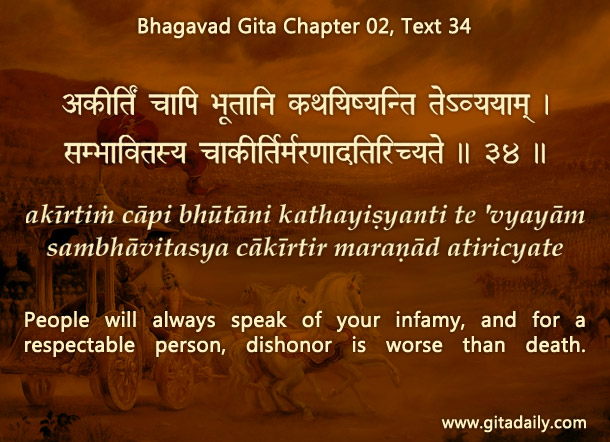When Arjuna puts aside his bow (01.46) at the start of the Kurukshetra war, one way that Krishna urges Arjuna to pick up his bow is by stating a psychological truth: For a warrior like Arjuna who has been celebrated as a fearless and peerless hero, being mocked as a coward will hurt worse than death (02.34).
Intriguingly, Krishna later uses the same observation to prompt Arjuna to put down his weapon. On the seventeenth day of the Kurukshetra war, Karna defeats and wounds Yudhishthira, who returns to his tent for recovering. On learning about Yudhishthira’s injuries, an anxious Arjuna returns to check his oldest brother’s health. Yudhishthira presumes that Arjuna has killed Karna and congratulates him. But when he hears that Arjuna hasn’t even confronted Karna on that day, he bursts out, “O Arjuna, were you too afraid of Karna to even stay on the battlefield? If you are not ready to face Karna, why did you vow repeatedly to kill him? If you can’t keep your vow, better cast aside your Gandiva bow.” Yudhishthira didn’t mean those words literally — they were inadvertent expressions of his humiliation at being defeated and wounded in front of his entire army.
Hearing those words, Arjuna unsheathes his sword to behead Yudhishthira — he had vowed to kill anyone who dared say that he was unworthy of his Gandiva and should cast it aside. He doesn’t want to kill Yudhishthira, but feels vow-bound to do so. Krishna speedily intervenes, reminding Arjuna, “Dishonor is worse than death for a hero; therefore, insult Yudhishthira; no need to kill him.”
Accordingly, Arjuna condemns Yudhishthira as an inveterate gambler and so forth. Quickly finishing his tirade, Arjuna falls at his brother’s feet, seeking forgiveness. Though Yudhishthira is initially mortified, he eventually becomes pacified on understanding the context — and both brothers appreciate how Krishna has protected them from fratricidal disaster.
One-sentence summary:
Krishna as the supreme teacher shows how to expertly apply truths to different contexts — based on time-place-circumstance, the same truth can be used to inspire differing, even opposing, actions.
Think it over:
- Dishonor is worse than death — why does Krishna speak this truth at the start of the Kurukshetra war?
- How does Krishna use the same truth differently later?
- What does Krishna’s expert application of this truth demonstrate?
***
02.34: People will always speak of your infamy, and for a respectable person, dishonor is worse than death.
To know more about this verse, please click on the image


Leave A Comment